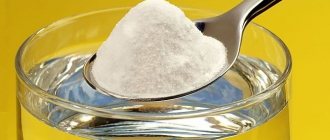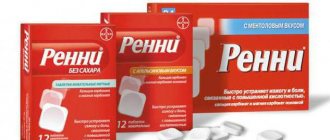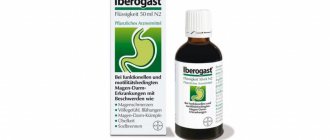General characteristics of the drug
Rennie is an antacid drug. It is intended to eliminate acid-dependent conditions and pathologies of the gastrointestinal tract. The active substances are magnesium and calcium carbonate. These compounds are able to quickly and permanently neutralize excess hydrochloric acid. As a result, the mucous membrane of the esophagus and stomach is not irritated and a feeling of discomfort does not arise.
Rennie tablets dissolve well and contain a large amount of calcium, due to which their effect appears within 3 minutes. After the reaction of active substances with hydrochloric acid, magnesium and calcium salts are formed. They pass from the stomach to the intestines and exit the body in the feces. About 10-20% of the elements are absorbed and partially excreted by the kidneys.
Taking other medications with Rennie is not recommended, as the rate and extent of their absorption may be reduced. The interval between the antacid and the other drug should be at least one hour.
Rennie is available in the form of chewable tablets. Pharmacies offer options with menthol, orange and mint scents. All tablets are white, square with rounded edges and engraved with “RENNIE” on both sides.
Depending on the dosage and duration of use, you can purchase the most suitable number of tablets. The package can contain 12, 24, 36, 48 or 96 pieces. The minimum cost is 150 rubles.
HEARTBURN REMEDIES FOR PREGNANT WOMEN
If lifestyle changes do not help get rid of unpleasant symptoms after eating, doctors select medications for expectant mothers with the least side effects. The most commonly prescribed drugs are antacids1,3.
Antacids are substances that neutralize excess hydrochloric acid that is part of the gastric juice. As a result, even when gastric juice enters the esophagus, it does not irritate the mucous membrane and does not cause symptoms of heartburn. The simplest antacid that used to be very popular is sodium bicarbonate, or baking soda. Unlike modern medications, soda does not act for long: in reaction with hydrochloric acid, carbon dioxide is formed, which stimulates juice secretion and, accordingly, a new attack of heartburn. It’s not worth “treating” this way for a long time: sodium retains fluid in the tissues, and swelling is undesirable for pregnant women3.
Antacid medications containing calcium and magnesium, natural and natural elements for the body, help fight heartburn. Calcium and magnesium compounds reduce acidity in the stomach and protect its mucous membrane without harming the body. Preparations containing these elements can be taken even by pregnant women3.
Indications and contraindications
Is it possible to use Rennie during pregnancy? Yes, the instructions for the drug say that dyspepsia during this period is one of the direct indications. Only a small part of calcium and magnesium (10-20%) is absorbed into the blood and therefore cannot have a significant effect on the fetus. For the most part, medicinal compounds are excreted in the feces.
The main indication for prescribing Rennie during pregnancy is heartburn and gastroesophageal reflux. The drug quickly eliminates unpleasant symptoms, but does not affect the cause of their occurrence, so you should take the pill only when you experience pronounced discomfort in the stomach or esophagus (burning, pressure, pain, etc.).
Rennie is also indicated for functional disorders of the digestive tract. After taking it:
- Eliminates belching, accumulation of gases, burning sensation in the epigastric area, and a feeling of fullness in the stomach;
- smooth muscle motility is restored;
- Dyspeptic symptoms are reduced.
As a symptomatic remedy, Rennie can be used in the complex treatment of diseases of the gastrointestinal tract observed before pregnancy and aggravated during it. The duration of administration and daily dosage of the drug are prescribed individually.
Despite the safety of Rennie during pregnancy, the instructions for use prohibit its use in case of individual hypersensitivity to components, fructose intolerance (for options with menthol and mint scent), as well as in case of renal failure and nephrocalcinosis.
Rennie
Rennie ®
(lat. Rennie ®) is an antacid drug used in the treatment of acid-related diseases of the upper digestive tract.
Active ingredients:
calcium carbonate + magnesium carbonate.
Composition of the drug Rennie
Three versions of the medicine are officially registered in the Russian Federation: sugar-free mint chewable tablets, menthol-flavored chewable tablets, and orange-flavored chewable tablets.
Each Rennie tablet contains calcium carbonate 680 mg and basic magnesium carbonate 80 mg.
Excipients:
sucrose - 475 mg, pregelatinized corn starch, potato starch, talc, magnesium stearate, light liquid paraffin, menthol flavor, lemon flavor.
Excipients
for “sugar-free” tablets: sorbitol, pregelatinized corn starch, potato starch, talc, magnesium stearate, light liquid paraffin, mint flavor, sodium saccharinate.
Pharmacological action of the drug Rennie
Rennie contains antacid substances - calcium carbonate and magnesium carbonate, which provide rapid and long-lasting neutralization of excess hydrochloric acid in gastric juice, thereby having a protective effect on the gastric mucosa.
Achieving a positive effect within 3–5 minutes is due to the good solubility of the tablets and the high calcium content. As a result of the interaction of rennie with gastric juice, soluble calcium and magnesium salts are formed in the stomach. The level of absorption of calcium and magnesium from these compounds depends on the dose of the drug. The maximum absorption level is 10% calcium and 15-20% magnesium. A small amount of absorbed calcium and magnesium is excreted through the kidneys. If renal function is impaired, plasma calcium and magnesium concentrations may increase. In the intestines, insoluble compounds are formed from soluble salts, which are excreted in the feces. The positive effects of Rennie are not limited to the acid-neutralizing activity of its components. Calcium and magnesium cations are able to bind bile acids in the lumen of the stomach. At the same time, at low pH values, the binding of calcium ions to bile acids increases, while at pH = 6, conjugation processes are minimal. Calcium ions interact with bile acids to a greater extent than magnesium ions. It is important that calcium and magnesium are more tropic towards lipophilic bile acids, in particular deoxycholic and taurocholic acids, which are characterized by the greatest cytotoxicity (Simanenkov V.I. et al.).
An important feature of the drug Rennie is the speed of onset of the antacid effect, due to the rapid increase in intragastric pH. This is supported by the results of a double-blind, placebo-controlled study comparing the time to gastric pH >3.0 with Rennie, ranitidine, famotidine and placebo. The analysis showed that the target gastric pH value was reached after 5.8, 64.9, 70.1 and 240.0 minutes, respectively.
When prescribing antacids containing calcium carbonate, doctors are often afraid of the development of “acid rebound” (increased production of hydrochloric acid after stopping the drug). A number of studies evaluating acid rebound after a single dose of 1 or 2 Rennie tablets have demonstrated that the average gastric pH within 60–90 (and 90–120, 120–150, and 150–180) minutes after administration of the drug , has no statistically significant differences compared to pH values after taking placebo. The absence of “acid rebound” is explained by the magnesium included in Rennie, which can act as an antagonist of calcium-induced gastric hypersecretion (A.S. Trukhmanov, Yu.V. Evsyutina).
Indications for use Rennie
Symptoms associated with increased acidity of gastric juice and reflux zophagitis: heartburn, belching, periodic pain in the stomach;
feeling of fullness or heaviness in the epigastric region; flatulence, dyspepsia (including those caused by errors in diet, taking medications, abuse of alcohol, coffee, nicotine); dyspepsia in pregnant women. Rennie is recommended for use in the “on demand” mode. Calcium carbonate, which is part of the drug, has a rapid and long-lasting acid-neutralizing effect, enhanced by magnesium carbonate. In the stomach, calcium carbonate and magnesium carbonate react with hydrochloric acid in gastric juice, forming water, soluble mineral salts and carbon dioxide:
CaCO3+2HCl→CaCl2 +H2O + CO2,
MgCO3+2HCl→MgCl2 +H2O+CO2.
A statistically significant increase in the stomach is observed from the first minutes of taking the drug, and on average after 2.5–5.8 minutes the pH in the stomach exceeds 3 (Simanenkov V.I. et al.).
Contraindications
- severe renal failure
- hypercalcemia
- hypersensitivity to Rennie's components
Directions for use: Rennie and dosage
Adults and children over 12 years of age: unless otherwise recommended by a doctor, when symptoms appear, chew 1-2 Rennie tablets or keep in the mouth until completely dissolved.
If necessary, you can repeat Rennie's dose after 2 hours. The maximum daily dose is 11 Rennie tablets. Special instructions:
Patients with impaired renal function are not recommended to take the drug for a long time in high doses. When prescribing Rennie to patients with impaired renal function, the concentration of magnesium and calcium in the blood serum should be regularly monitored. Taking high doses of Rennie may increase the risk of kidney stones.
Long-term use of high doses in combination with milk or dairy products can cause the development of milk-alkali syndrome.
Instructions for patients with diabetes:
1 Rennie tablet contains 475 mg of sucrose. 1 sugar-free Rennie tablet contains 400 mg of sorbitol and saccharin and can be used by patients with diabetes. If the use of the drug is ineffective, you should consult a doctor for advice.
Interaction of Rennie with other drugs:
Medicines should be taken 1-2 hours before or after taking Rennie.
With simultaneous use, Rennie reduces the absorption of tetracycline antibiotics, fluoroquinolones, and phosphates. Rennie does not affect the ability to drive a car or operate other mechanisms.
Use of Rennie during pregnancy and breastfeeding. When used in recommended doses, Rennie does not pose a danger to the fetus or child.
Clinical and pharmacological group:
antacid drug. According to ATC, Rennie belongs to the group “A02 Drugs for the treatment of diseases associated with acidity disorders” and has the code A02AX.
Rennie is an over-the-counter product.
Manufacturer:
Bayer Sante Familiale, France.
Resources for healthcare professionals regarding the use of Rennie
Articles and official instructions
- Minushkin O.N., Maslovsky L.V., Balykina V.V., Zarubina E.N. Clinical use of the drug Rennie. Kremlin medicine. Clinical Bulletin. - 1998. - No. 2.
- Tyutyunnik V.L., Elokhina T.B. Prevention and treatment of gastroesophageal reflux disease in pregnant women // RMZh. – 2009. – T. 16. – No. 16.
- Simanenkov V.I., Tikhonov S.V., Lishchuk N.B. Antacids: are they in demand in the era of proton pump inhibitors? // RMJ. 2017. No. 3. pp. 157-161.
- Nikushkina I.N., Lezhneva Yu.L., Shah Yu.S. Fast-acting antacid drugs and the scope of their use in modern therapy of acid-related diseases // Medical Council. 2014. No. 17. pp. 38–41.
- Trukhmanov A.S., Evsyutina Yu.V. Heartburn in gastroesophageal reflux disease – mechanism of development and approaches to therapy // Breast Cancer. 2017. No. 10. pp. 707–710.
- Instructions for medical use of the drug Rennie (chewable tablets without sugar [mint]). Addition No. 1 of September 14, 2012 to the Instructions for medical use of the drug Rennie (chewable tablets without sugar [mint], chewable tablets without sugar [cooling taste]).
On the website GastroScan.ru in the “Literature” section there is a subsection “Antacids”, containing articles devoted to the treatment of diseases of the gastrointestinal tract with antacids.
Video
Still from video Vovk E.I.
Medicines for the treatment of heartburn and diseases associated with hyperacidity. Clinical pharmacology On the website GastroScan.ru in the “Video” section there is a subsection for patients “Popular Gastroenterology” and subsections “For doctors” and “For medical students and residents”, containing video recordings of reports, lectures, webinars in various areas of gastroenterology for healthcare professionals and medical students.
Rennie has contraindications, side effects and application features. Consultation with a specialist is necessary. Back to section
Mode of application
Rennie during pregnancy should be taken in the same way as during other periods: dissolving or chewing 1-2 tablets immediately after the onset of symptoms of dyspepsia (heartburn, belching, bloating, flatulence). If necessary, you can repeat it after 2 hours. The maximum dosage per day is 11 tablets.
If you follow the recommended dosage, there is virtually no risk of side effects.
But you need to take into account that Rennie supplies the body with calcium, so if the doctor additionally prescribes drugs with this element, then their intake will require adjustment.
Side effects
Rennie is well tolerated by pregnant women and side effects are extremely rare. In some cases (with prolonged use or overdose), allergic reactions, most often skin reactions, changes in stool density, and diarrhea may occur. After a certain time after taking the tablet, a compensatory increase in the acidity of gastric juice is possible.
In women with impaired renal function, hypercalcemia and hypermagnesemia may develop during long-term treatment. Patients suffering from diabetes mellitus must take into account the sucrose content in the drug (475 mg/piece). Read more about diabetes in pregnant women→
Safe analogues
You can get rid of moderate heartburn without the use of medications. Regular consumption of alkaline mineral water (Essentuki, Borjomi) neutralizes hydrochloric acid due to the presence of baking soda in it. In order to eliminate the burning sensation, 1 glass of drink is enough. Before you drink it, you need to release the gas from the water.
As for pharmaceuticals, you can replace Rennie with Tams or Andrews antacid tablets. They are its structural analogues (the active ingredients are the same). The drugs Gaviscon and Maalox have the same effect.
During pregnancy, Rennie quickly eliminates heartburn and other dyspeptic symptoms; reviews from many expectant mothers confirm this. It is safe at any time and, if the dosage is observed, practically does not cause adverse reactions. However, you should take the tablets as prescribed by your doctor, as they interfere with the action of other medications (for example, those containing iron and calcium).
Author: Olga Khanova, doctor, especially for Mama66.ru
PREVENTION OF HEARTBURN
The best way to get rid of heartburn is to prevent it. To do this, doctors recommend reviewing habits and menus, eliminating provoking factors. Moreover, these tips work not only during pregnancy. Try1,3:
- Do not indulge in salty, spicy and fatty foods, eat less tomatoes, onions, citrus fruits;
- Avoid coffee, alcohol, carbonated drinks - they all increase the risk of heartburn;
- Eat in small portions, but more often - this way the food will not overfill your stomach;
- Wait at least an hour before going to bed after eating;
- Moving, but not too actively, will help reduce discomfort.
A popular folk remedy for heartburn - milk - only partially works. Yes, it temporarily neutralizes excess hydrochloric acid, but the fat contained in milk stimulates the production of gastric juice, which means it causes heartburn again. If you drink milk for heartburn, then low-fat milk and in small quantities.
Useful video: how to get rid of heartburn during pregnancy?
Heartburn: causes - consequences. What to do with it during pregnancy?
We recommend reading: Nutrition during pregnancy: by week and trimester
Author
Olga Khanova
Author of the portal Mama66.ru
Share









